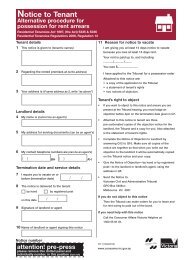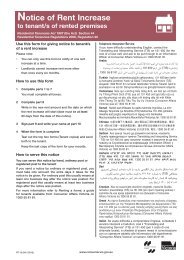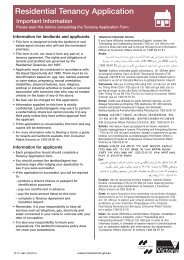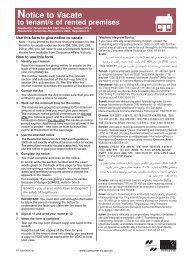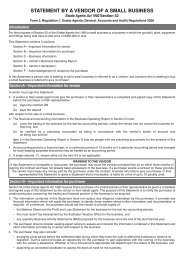Renting a home: a guide for tenants - Consumer Affairs Victoria
Renting a home: a guide for tenants - Consumer Affairs Victoria
Renting a home: a guide for tenants - Consumer Affairs Victoria
Create successful ePaper yourself
Turn your PDF publications into a flip-book with our unique Google optimized e-Paper software.
Challenging a ‘Notice to Vacate’<br />
You have the right to challenge a ‘Notice<br />
to Vacate’. You may argue against the<br />
notice if it is not given properly or if you<br />
disagree with the reason given.<br />
You can also challenge a ‘Notice to Vacate’<br />
given <strong>for</strong> no specified reason or to end a<br />
fixed-term tenancy, if you believe it was<br />
given because you were exercising your<br />
legal rights or saying you would do so.<br />
You must apply to the <strong>Victoria</strong>n Civil<br />
and Administrative Tribunal (VCAT)<br />
to challenge a notice within specific<br />
timeframes depending on the reason and<br />
the minimum time period of the notice.<br />
You must apply to VCAT within:<br />
• 60 days of receiving a 120-day<br />
‘no specified reason’ notice<br />
• 28 days of receiving a 90-day notice<br />
to end a fixed-term agreement<br />
• 21 days of receiving a 60-day<br />
‘end of fixed-term’ notice<br />
• 30 days of receiving any other<br />
60-day notice.<br />
Asking <strong>for</strong> more time to vacate<br />
If you have been served with a ‘Notice to<br />
Vacate’ but are finding it difficult to move<br />
out of the property on time, you may try<br />
to negotiate a solution with your landlord.<br />
You can also contact <strong>Consumer</strong> <strong>Affairs</strong><br />
<strong>Victoria</strong> or a tenancy advocacy service <strong>for</strong><br />
more in<strong>for</strong>mation about your options.<br />
Getting evicted<br />
If you have been given the appropriate<br />
notice to vacate your rental property,<br />
and have not left by the end of the due<br />
date, the landlord can seek an Order <strong>for</strong><br />
Possession from the <strong>Victoria</strong>n Civil and<br />
Administrative Tribunal (VCAT).<br />
This order may instruct you to vacate.<br />
It may also allow the landlord to obtain a<br />
Warrant <strong>for</strong> Possession, which may then<br />
be executed by the police to evict you.<br />
Remember:<br />
A landlord cannot personally<br />
use <strong>for</strong>ce to remove you from<br />
the property. Only the police may<br />
carry out an eviction, and only<br />
when they are acting on a Warrant<br />
<strong>for</strong> Possession.<br />
VCAT will set a hearing after your notice<br />
to vacate has expired. You must go to<br />
the hearing if you wish to dispute the<br />
landlord’s reason <strong>for</strong> wanting to evict you.<br />
If you are likely to be evicted, try to<br />
make arrangements so that you will have<br />
somewhere to stay.<br />
You should also organise to collect your<br />
belongings > see page 34 <strong>for</strong> details.<br />
<strong>Consumer</strong> <strong>Affairs</strong> <strong>Victoria</strong>,<br />
the Tenants Union of <strong>Victoria</strong><br />
and other organisations can<br />
provide support, advocacy<br />
and advice to people who are<br />
facing eviction.<br />
PART 3: Ending a tenancy<br />
See page 38 <strong>for</strong> more in<strong>for</strong>mation<br />
about <strong>Consumer</strong> <strong>Affairs</strong> <strong>Victoria</strong>’s<br />
Tenancy Advice and Advocacy<br />
Program, and the Tenants Union<br />
of <strong>Victoria</strong>.<br />
31



